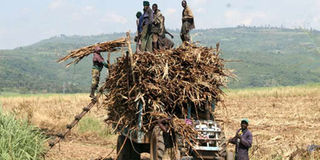Powerful economic forces control the global trade; who will protect the poor?

Sugarcane cutters load the produce onto a tractor from a farm in Muhoroni. PHOTO | JACOB OWITI | NATION MEDIA GROUP
What you need to know:
- In the rhetoric, each side has been posturing as the real champion of the poor sugar cane farmers and accusing the other side of being the bad guys who should be blamed for the pathetic state of Kenya’s sugar industry.
- The stronger nations of the world are able to both negotiate and enforce deals that serve their domestic interests but often work against countries in the so-called developing world.
- African governments have long complained to the WTO that US and European agricultural subsidies are hurting African farmers, but these pleas have landed on deaf ears.
The so-called secret “sugar deal” that was purportedly signed by President Uhuru Kenyatta during his recent trip to Uganda has created a political storm and raised some fundamental questions about the regulation of trade within the East African Community.
The media have framed the debate as a simplistic political duel between the Jubilee Government and the opposition Cord alliance.
In the rhetoric, each side has been posturing as the real champion of the poor sugar cane farmers and accusing the other side of being the bad guys who should be blamed for the pathetic state of Kenya’s sugar industry.
If there is one thing that has stood out from this vitriolic debate, it has been a confirmation of the popular African proverb that when the elephants fight, it is the grass that gets hurt.
The grass in this case is the sugar cane farmer. The story of sugar cane farmers in Kenya is a sad one that presents a perfect picture of what ails Africa generally.
VERBAL BATTLE
The verbal battle between Kenya’s two dominant political camps made the issue look very local. Yet the truth is that the conversation surrounding “trade deals” is a global one, which is bigger and much more complex than many people realise.
In the global marketplace, powerful political and economic forces determine the course of trade, often at the expense of the world’s poor.
The stronger nations of the world are able to both negotiate and enforce deals that serve their domestic interests but often work against countries in the so-called developing world.
The US, for example, spends billions of dollars every year subsidising its agricultural sector. These subsidies lead to over-production of commodities and dumping of surpluses on the global markets.
From whatever angle we look at it, global trade is a lopsided game — like a boxing match between an experienced heavyweight fighter and a lightweight novice. There is no way such a fight could be deemed as fair.
The only hope for the poor and the weak in this game of trade lies in finding a fair, just and impartial referee who has the heart and the guts to blow the whistle and step in and ensure the playing field is levelled.
GLOBAL REFEREE
When it comes to global trade, Africa is clearly the grass. Africa continues to be trampled on by the stampede of elephants who have the muscle to negotiate and conclude complex trade deals which we Africans don’t even have the capacity to fully comprehend.
Where in the world do we find a fair and just referee to regulate the game? The official answer is that there already is a global referee: the World Trade Organisation (WTO).
The Geneva-based WTO is a membership body created in 1995 specifically to regulate international trade and to ensure that global trade is conducted smoothly, freely and predictably.
But how capable or prepared is the WTO to deal with the issues of unfair trade practices that have impeded African farmers from competing in the global markets?
In spite of its high mandate to ensure fair trade, the WTO appears to be controlled and manipulated by the dominant members who already have a commanding hold on the global markets.
NOT INDEPENDENT
African governments have long complained to the WTO that US and European agricultural subsidies are hurting African farmers, but these pleas have landed on deaf ears. The referee is not independent and seems unable to blow the whistle in spite of the obvious flaws in the way the game is played.
In December this year, the WTO will hold its high level Ministerial Conference in Nairobi. The meeting, which is held once every two years, is significant in that it will be the first time since the WTO was created that such a high-level global trade meeting will have been held on African soil.
The meeting presents a unique opportunity, not just for Kenya, but for all African countries to make their voices heard. Clearly, something new has to happen.
In the meantime, the African farmer continues to sink deeper into poverty and dependency as global, regional and local sugar barons, cotton barons, coffee barons and numerous other well-placed barons get richer through trade deals that serve only their interests. Someone please blow the whistle.
Mr Ondeng is a consultant on leadership and governance.





